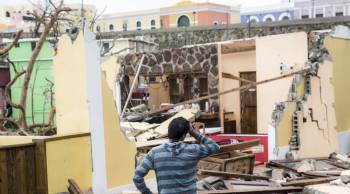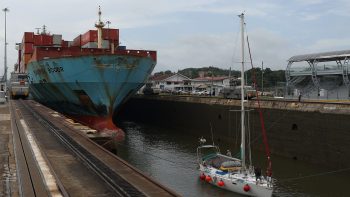Private water flash point
TEXT OF STORY
KAI RYSSDAL: President Bush has had a busy day — he signed that student loan bill we mentioned, he ordered the Treasury Department to impose new economic sanctions on Burma, and he hosted a meeting of major polluting countries today.
Among the critics was South Africa’s environment minister, who suggested the presidents proposals don’t really solve the problems of global warming. Water scarcity is one of them.
Using new water meters, South Africa’s found a way to put conservation and commerce on the same page. But Gretchen Wilson reports human costs don’t appear on the bill.
GRETCHEN WILSON: The government launched “Operation Save Water” in this neighborhood four years ago. Households get 6000 liters, or about 16,000 gallons, of water free every month.
The electronic meters are like this one at Jennifer Makoatsane’s house — it switches off the water once the free limit is reached, unless she buys credits at a municipal office in advance. And that’s the problem.
JENNIFER MAKOATSANE: We have 753.12 litres left for this month. So we’ll be running out before the end of the month. It’s so difficult!
There are eight people in Makoatsane’s household. No one’s working, and they live on a monthly pension of $115. They can’t pay an extra $10 bucks a month for water, so they ration what they get for free: Six-and-a-half gallons per person, per day.
Everyone uses the same bath water. They use the water from washing dishes or doing laundry to flush the toilet. Even then, they run out — so they steal it.
MAKOATSANE: Sometimes we would go sneak at night. There’s a gate in my neighborhood at the opposite end, and I would go sneak at night and use their water.
Commodifying water has quite literally created an underground economy. Some outlying neighborhoods aren’t yet metered, and have started selling water from outside taps. That’s where Nthabiseng Ntimbani pays to do her laundry.
NTHABISENG NTIMBANI: You can wash as long as you like, because they don’t have pre-paid water meters. But you’ll do that for money.
About 80 cents to wash bed linens or diapers. Or $1.50 to fill a garbage can to take back home.
Zodwa Mokhosi defied pressure to sign up for the water system, so the water authorities cut off her toilet. She hired a plumber who found a way to connect all her pipes. Now she has the only tap that won’t get cut off, and she lets neighbors take water for free. That’s made her very popular.
ZODWA MOKHOSI: Everybody’s coming here! The water is too much — it’s expensive!
Johannesburg Water says the $60-million project has saved billions of gallons of water. But poor residents here say they’re carrying a disproportionate share of that conservation. Big industries aren’t curbed at all. And some here work as gardeners and maids in homes in the posh suburbs. They see the extravagance of the elite.
MAKOATSANE: They are lending moneys on conditions that they privatize very important and vital basic services.
Protests in South Africa’s poor neighborhoods have thwarted the system’s rollout. That’s happened in dozens of countries, from Bolivia to Malawi, that have implemented similar privatized water schemes. And the French company Suez has been at the forefront of some of these initiatives.
Meshack Tladi is with the Coalition Against Water Privatization. He’s cutting out hand-written flyers about an upcoming meeting on resisting water meters. Tladi teaches people how to jerry-rig and bypass them.
MESHACK TLADI: We are calling it Operation Vul’amanzi — Operation Enjoy Free Water, Operation Open the Water. Just bypass the meter and enjoy free water.
Even though it’s illegal, he says he’s just taking back a basic human right.
TLADI: We are prepared, even if they want to arrest all of us — they can do that! But at the end they will realize they will end up arresting the entire nation.
Tladi and his family have faced police threats. But when you’re fighting for water you can’t surrender. In Phiri, South Africa, I’m Gretchen Wilson for Marketplace.
There’s a lot happening in the world. Through it all, Marketplace is here for you.
You rely on Marketplace to break down the world’s events and tell you how it affects you in a fact-based, approachable way. We rely on your financial support to keep making that possible.
Your donation today powers the independent journalism that you rely on. For just $5/month, you can help sustain Marketplace so we can keep reporting on the things that matter to you.


















